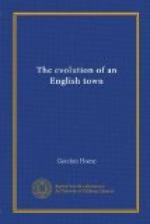appears, and pleads that he and his ancestors and
the tenants of the Manor of Levisham have from ancient
time taken the browsewood and dry sticks in the said
woods and burnt them into charcoal, and afterwards
exposed them for sale, and given them away at pleasure
as part of his and their manorial rights. He
asks that the officers of the forest may try the question.
As it clearly appears to the Court by the answer of
Sir John that he is making a claim to take a profit
in the forest which he did not claim on the first
day of the Eyre, as the custom is, and as proclamation
was made, judgment is given that the liberty be seized
into the Lord’s hands, and Sir John is to answer
for its value in the meantime. Afterwards Sir
John appears, and prays that he may be allowed to
pay a composition for making his claim, and a composition
of 6s. 8d. is fixed. Surety, Richard de Naulton.
The jury also present that a bridge called Friar Bridge,
beyond the Costa, across which people are wont to
pass on horseback and on foot going from Pickering
to Malton, is in such bad repair that people cannot
pass over, but have to make a divergence of about
a mile and a half in the forest, treading down and
injuring the pasturage of the deer. The Abbot
of Rievaulx and all Abbots of that place are bound
to repair it. He is summoned, appears, and does
not deny that he and they are bound to repair it, but
he says that the bridge is not in such bad repair
that people cannot pass over it as they are wont and
ought to do without doing harm to any one. He
asks that an inquiry may be made by the officers of
the forest. An inquiry is directed. The
foresters, verderers, and regarders, sworn and charged,
say on their oaths, that after the summons for the
Eyre was issued, the bridge was in such bad repair
that people being unable to pass over it made a divergence
into the forest, annoying the Lord’s deer and
treading down their pasturage. Afterwards the
Abbot repaired it so that it requires nothing further,
and people can quite well pass over it. Therefore
as to the present repair of the bridge the Abbot is
acquitted, but he is to be amerced because he did
not repair it before.
“The jury also present that the present Prior
of Bridlington erected a sheepfold at Newland in the
forest, 100 feet long and 12 feet broad, injuring
thereby the Lord’s deer, notwithstanding that
on another occasion at the last Eyre of the Justices
the sheepfold was ordered to be taken down. By
what right they know not. The Prior appears and
prays to be allowed to compound with the Lord, and
that he and his successors may rent the sheepfold
in perpetuity, inasmuch as it no longer injures the
deer. Since the foresters, verderers, and regarders
prove that it is so the Prior is permitted to compound
by the payment of 13s. 4d. (surety Ralph de Morton),
and he is likewise given a grant for ever of the sheepfold
at a yearly rent of 6d. at Michaelmas. The Prior
is to hold it for ever quit of regard. The jury




